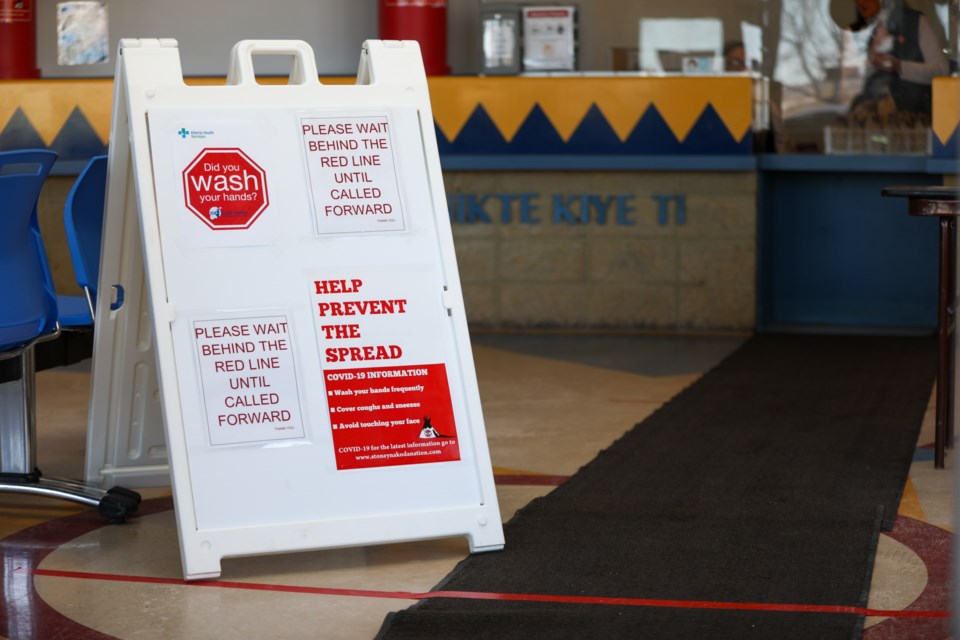STONEY NAKODA FIRST NATION— Stoney Nakoda First Nation has received a national award for their handling of the COVID-19 pandemic.
Stoney Nakoda Emergency Management director Mike Crawford, Bearspaw First Nation Chief Darcy Dixon, Chiniki First Nation Chief Aaron Young and Wesley First Nation Chief Clifford Poucette were on hand to receive the IAEM Canada National Prepared Community award for Pandemic Preparedness and Response on Friday, Nov. 13.
“It’s quite an honour for everyone here,” Crawford said. “It felt really, really good because it’s such a team effort. It’s not just one person, it’s the whole Nation."
The award was in recognition of the Nation’s preparedness and the precautions put in place during the COVID-19 pandemic.
The event was made all the more special as it marks the first time a First Nation community has received the award.
Crawford said he remembers the first meeting between Emergency Management and the three Stoney Nakoda Chiefs when the COVID-19 virus was first identified in Alberta— The meeting started at about 4 p.m. and lasted until about 2 a.m. In the end of they were able to develop a pandemic plan with the full support of Stoney Nakoda leadership. The plan continues to guide the Nation during COVID-19.
Three major challenges were identified in their first meeting— Communications, setting up an isolation centre and ensuring Nation members have food security. They solved those problems and have continued to solve challenges as they emerge during the pandemic.
“It’s a formalized process that really works,” Crawford said.
He added he is especially proud of the creation of their incident command system.
The plan developed in Stoney Nakoda follows the incident command system as an international business model and so far has found success in managing the pandemic in the Nation.
They have regular daily meetings with the leadership team to share information and identify emerging challenges and potential solutions.
He is grateful for how well the team has worked together during the pandemic to protect the Nation.
Crawford said they are always prepared for forest fires floods, power outages and other environmental disasters, but COVID-19 has proved to be unique because it is a health emergency.
Stoney Health has taken the lead on the incident command team with the health director serving as the operations chief during the pandemic response.
Initially, an isolation centre was established on the Nation with 150 beds at the Morley Community School.
“We’ve downgraded it now, but at the time we were preparing for the worst,” Crawford said. “Right now, we’ve got a 30-bed isolation in place.”
Other steps taken to help limit the spread of the virus include staggered work times, one way in and out of offices, lots of sanitizing, dividers between workers and other steps to keep employees safe.
As leadership the goal is to impart positive health practices to the community, Crawford said, so community members take the pandemic and its associated health regulations seriously.
Like the rest of the province, Stoney Nakoda First Nation is seeing an increase in the number of COVID-19 cases on the Nation— Prior to this, they had managed to keep case numbers fairly low.
“Now that cases are starting to rise that means we increase our efforts,” Crawford said. “We’ve gone over and above what Alberta Health Services regulations are because we are a vulnerable population.”
Currently, Nakoda Emergency Management is recommending travel restrictions between Nations, going into the surrounding towns and is asking that non-Nation members do not visit Stoney Nakoda unless they have approval or work in the area.
On Monday (Nov. 30) as a precaution to help limit the spread of the virus the Stoney Daycare, Stoney Health Services Headstart, Nakoda Elementary School, Morley Community School and Nakoda Buslines closed until further notice.
“It’s better to air on the safe side,” Crawford said. “We all work together and share information it’s a big team effort."
The Canadian government has been very supportive of the Nation during COVID-19, Crawford noted, adding they have also been working very closely with the province and the surrounding municipalities. They continue to receive daily updates from the province regarding case numbers.
“Everybody’s just been great in offering help,” Crawford said. “It’s been a really good process— There’s lots of ground support.”
There are currently 17 active cases of the virus in Stoney Nakoda First Nation.
Read more from CochraneToday.ca



